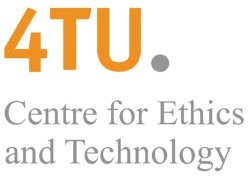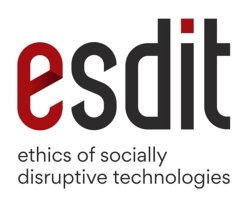Welcome to the the introductory blog to the 4TU-ESDiT conference blog series!
With the theme of “Rethinking Ethics – Reimagining Technology”, this conference aims to address the question what philosophy and ethics of technology mean today. It accordingly seeks to bring together scholars working on philosophy and ethics of technology, whether this work concerns conceptual analysis, reflections on methods for studying and evaluating technology, case-studies in the ethics of (disruptive) technologies, sustainable technology, praxis-oriented approaches geared towards design and social implications, or topics related to these.
For the blog writing guidelines, see this page.
Joint organization by 4TU.Ethics and ESDiT

The 4TU.Center for Ethics and Technology is a collaboration between four technical Universities in The Netherlands: Delft University of Technology, Eindhoven University of Technology, Wageningen University & Research and University of Twente. It is a community of researchers that aims to stimulate and perform research in the field of ethics and technology, both fundamental and applied. 4TU.Ethics aims to address societal challenges in the context of a globalized and inter-connected world, and to advance understanding of ethical issues in engineering and technology development.

The overall aim of the ESDiT research programme is to develop a comprehensive philosophical understanding of the socially disruptive technologies (SDTs) of the 21st century, and in particular their challenge to the very concepts and values that we normally appeal to in our moral thinking. These concepts and values form the basis of our current moral, political, and anthropological order. There is an urgency to this aim, as we need to develop new moral frameworks to guide these technologies for the betterment of humanity.
Overview of tracks
Track 1: AI - Intelligent Artifice?
This track concerns AI. On the one hand, we invite contributions focusing on fundamental and conceptual issues in AI, for instance pertaining to ‘trustworthiness’, ‘explanation’, ‘human-centered’, ‘responsible’ or ‘behavior, manipulation, and autonomy’. On the other hand, we welcome contributions focusing on practices and prospects, for instance regarding ELSA, RRI, and VSD in the context of AI, or the philosophical and socio-political implications of generative AI in brain-computer interfacing (BCI) and mind-reading. Perspectives include (but need not be limited to): Philosophy of Technology; Science and Technology Studies (STS); ethical theory; philosophy of science; philosophy of mind; social theory; as well as more heterodox perspectives from literary studies (e.g. science fiction) and critical media studies.
Questions include (but are not limited to):
- How to understand ‘human centric’ AI and how can it be analyzed in terms of power?
- How (not) to revisit and/or update methodologies from ESLA, RRI, and VSD to democratize AI?
- How to navigate the prospects of ‘mind reading’ by way of generative AI and BCIs, both philosophically and socially?
- How to understand manipulative technology in general, and in particular in relation to EU’s AI act? And how to evaluate in terms of an ethics of influence?
Track 2: Bodies, Minds, & Subjects
This track will focus on the myriad relations between technology, embodiment, subjectivation, as well as issues related to cognition and philosophy of mind. It invites contributions concerning sexual technologies, datafication and embodiment, as well as cognition (e.g. embodied, distributed, 4E vs mechanistic explanations, and neurotechnologies). Besides philosophy of technology, perspectives may include (but need not be limited to) philosophical anthropology, posthumanism, disability studies, (post)structuralism, philosophy of mind, and phenomenology.
Questions include (but are not limited to):
- How are (data) technologies informed and shaped by our environments, subjectivities, and vice-versa?
- How to understand the relation between embodiment, subjectivation, and power?
- What constitutes technology-induced vulnerability, and how can vulnerability be analyzed in the context of intimate (digital) technologies and embodiment?
- How to understand objectification, (de)humanization, and (de)subjectivation in relation to new technologies and particularly sexual technologies and/or neurotechnologies?
Track 3: Concepts & Values
This track focuses on conceptual issues in contemporary philosophy and ethics of technology. Besides contributions focusing on fundamental concepts, conceptualization as such, or conceptual issues within relevant sub-disciplines (e.g. related to concepts such as agency, accountability, or responsibility), we invite contributions that focus on conceptual development and change, for instance regarding the meaning of progress in technology, science, and morality and the way they intertwine. Contributions focusing on conceptual engineering and the relation between conceptual change and value change are also welcome.
Questions may include (but are not limited to)
- What are the fundamental concepts in philosophy and ethics of technology today, and why do they (not) suffice?
- How are concepts constituted and how do they influence the discourse of philosophy and ethics of technology?
- How to understand concepts like progress and regress, whether in terms of science, technology, morality?
- How to understand and elucidate processes of conceptual change, particularly in relation to value change?
Track 4: Disruptive Technology & Health
This track focuses on the relation between (disruptive) technology, health, and health-care. We welcome contributions that evaluate radical and disruptive technological innovations in the field of health care, e.g. regarding how novel possibilities of prediction, diagnosis, and treatment (re)shape how health is understood (e.g. in terms of therapy vs enhancement). We further welcome work on how deployment of digital health, increased reliance on big data and AI transform and co-shape health-care relations (e.g. physician-patient relationships) and practices.
Questions include (but are not limited to):
- What innovative anticipatory methods and approaches to medical ethics are needed in order to prepare for and respond to disruptions in the domain of health?
- What disruptive effects can we anticipate from digital technologies such as AI, ambient home care technologies, and robotics, and how can historical studies, theoretical models, or anticipatory methods aid in evaluating such anticipation?
- How might technologies such as human enhancement disrupt our concepts of health and health care?
- What are public health challenges arising from disruptive health technologies, and which methods and approaches are need in order to navigate these challenges?
Track 5: Geo-Technology & Bio-Technology
This track concerns the relation between technology and the (living) environment. On the one hand, we welcome contributions on climate ethics, environmental ethics, and energy transitions. Suggested topics include (but need not be limited to) geo-engineering, sustainable technologies, de-extinction, environmental justice, or the processes, embedded values, and temporalities of energy transitions. On the other hand, we invite contributions on the philosophy and ethics of biotechnology, for instance with regards to environmental philosophy (e.g. biomimicry, digitalization of nature) or concerning the manipulation of living bodies more broadly conceived (e.g. embodiment, artificial wombs and natality, digitalization and manipulation of genetic data, the artificial (re)design of life).
Questions include (but are not limited to):
- How to reconsider justice vis-à-vis non-human entities such as the environment or planet in light of technologies such as gene-drives or biomimetic technologies?
- How to understand and evaluate the digitalization of nature in bio-tech practices?
- How to develop an ethics for the energy transition, and how to grapple with issues such as anthropocentrism, climate justice, distribution and differing temporalities?
- How may regenerative design contribute to shifting the meaning of sustainability?
- How do gene drives affect the notion of control of nature, and what kind and degree of control is desirable?
Track 6: Methodological Issues, Questions & Practices
This track focuses on methodological issues in contemporary philosophy and ethics of technology. We invite contributions that reflect on which methods or methodologies currently hold sway and how their possibilities and limits are to be evaluated. For instance, while much traditional ethics focuses on the individual, it remains questionable whether this translates to other agents (e.g. social groups, institutions, socio-technical systems), which becomes pertinent when considering the embedded values and moral properties of technological products and systems. We further welcome evaluations of how ethics, social sciences, and other disciplines (e.g. philosopohy of technology, STS, foresight analysis, critical social science, moral psychology, but also the design studies and the arts) can be fruitfully combined, for instance in analysis and assessment the societal impacts of technology. The latter may include reflections on transdisciplinary and collaborative methodologies and practices, for instance regarding forms of knowledge, ethical concerns, and ways of approaching these, both in terms of theoretical work and concrete case-studies.
Questions include (but are not limited to):
- Which philosophical and/or social-scientific methods or methodologies are relevant to the contemporary analysis of technology?
- How to consider ethics beyond the individual? Does a traditional conceptual focus on the individual seamlessly translate to groups, organizations, and institutions?
- What is an individual? How does it compare to supra-individual entities, both ontologically and in terms of moral standing?
- How (not) to engage ethics of technology in a transdisciplinary way, particularly in relation to controversial technologies?
Track 7: TechnoPolitics
This track will focus on politics and technology. We invite contributions that relate (disruptive) technology and design to questions of democracy, deliberation, and security, as well as to issues in political economy like automated labor, alienation, and the meaning of work. Contributions focusing on legal and juridical aspects are also encouraged. Perspectives may include (but need not be limited to) political philosophy, critical theory (of technology); conflict studies, juridical theory, theories of justice, deliberative democracy, and design studies.
Questions include (but are not limited to):
- How does disruptive (digital) technology help instigate or avoid socio-political tensions?
- How do disruptive technologies drive, mitigate, or change threats to national security?
- What kinds of (digitally mediated) deliberation and participation are more or less suitable to current technological issues such as climate change and (non)human enhancement?
- How to understand the relation between disruptive (digital) technological systems and juridical systems? Do novel technologies (e.g. AI) offer solutions to flaws in juridical systems, or do they accentuate existing problems?
- (How) can disruptive technology such as initiatives in e-government and digital deliberation ameliorate and promote democratic principles and practices?
- Do new digital technologies call for alternative democratic theories (e.g. adversarial democracy, experimental democracy), and how to evaluate such theories?
- Which ‘political’ design approaches foster “design for democracy” (e.g. critical, participatory, speculative, more-than-human design)?
- How to situate and understand the value and meaning of labor in light of automation on the one hand, and democratic principles on the other?
Publish your ideas in a blog
Are you a visitor or participant of the 4TU-ESDiT 2024 conference? Would you like to publish your conference talk or share any interesting ideas or thoughts inspired by the conference on the 4TU.Ethics blog?
On this special conference blog series we invite both presenters and attendees to contribute!
If you’re interested, check out the writing guidelines below.
Feel free to contact us with any questions via blog@ethicsandtechnology.eu
Blog writing guidelines
Required:
- Use short paragraphs
- Make sure your language is suitable for a wider audience.
- Make sure readers of the 4TU ethics blog (people interested in tech/philosophy, but potentially with limited background) can easily understand your story.
- Use headings and subheadings
- Include list of references at the end (if applicable)
Optional:
- Provide a title image. Also feel free to provide images throughout the text (always include image sources!). If you do not provide an image, we will add one ourselves.
Submit the blog
If you are a 4TU member, you can upload the blog yourself to the website and we will copy-edit it before publishing, in the manual below we explain how to do so. If you are not a member (or you just prefer not to upload yourself), please email the blog to us via blog@ethicsandtechnology.eu.